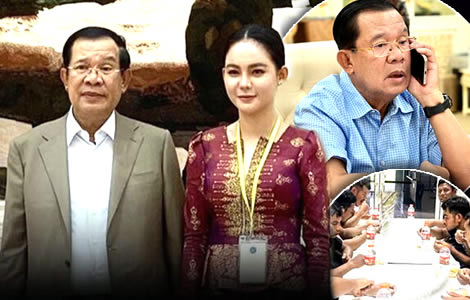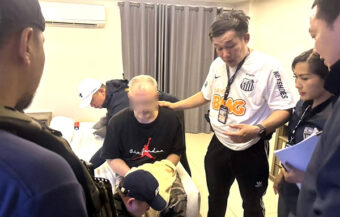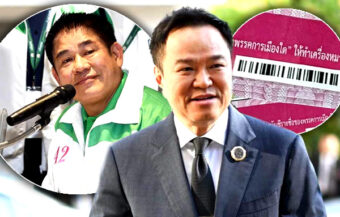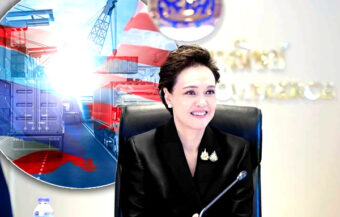Hun Sen purges rising star Thee Sovantha for exposing starving troops as Cambodia reels after mass surrender of soldiers, health crises among frontline troops and false Thai invasion claims—plunging the regime into chaos and raising fears over its leadership and morale.
Hun Sen’s grip on power is showing cracks. On Sunday, the erratic Cambodian leader fired a popular young influencer and deputy governor in Kandal Province. Thee Sovantha had dared to expose the grim realities faced by Cambodian troops on the Thailand border. This purge, coupled with wild and baseless claims of a sudden Thai attack just hours before a crucial border summit in Kuala Lumpur, reeks of desperation. It raises serious red flags about Cambodia’s leadership—and even more alarmingly, about the readiness and morale of its armed forces locked in a tense standoff with Thailand.

Cambodia’s long-time leader, Samdech Hun Sen, is under increasing pressure. Recently, criticism of his leadership has surfaced online. Although mostly indirect and tied to military issues, this criticism is gaining traction. On Sunday, Cambodian media reported a significant development. Hun Sen ordered the expulsion of a senior official from the Cambodian People’s Party (CPP). This party effectively controls the country and has done so for over 40 years under his rule.
The dismissed official is Thee Sovantha, a well-known online influencer and deputy governor of Ariyakasat Township in Kandal Province. Moreover, the Ministry of the Interior also officially dismissed her.
Thee Sovantha had posted several messages online criticising conditions for Cambodian soldiers on the frontline with Thailand. These posts sparked alarm among the ruling party.
Troop surrender and online posts expose cracks in military discipline and unity inside the ruling party
On July 29, a serious military embarrassment occurred. Twenty Cambodian soldiers, including officers, surrendered en masse to Thai forces near Sam Tae in Kantharalak District of Sisaket Province. Specifically, the group included one Second Lieutenant, two Sergeants Major, twelve Sergeants, two Corporals, and one Lance Corporal. They reported severe shortages of food and basic supplies. Consequently, their Thai captors had to feed them.
Thee Sovantha’s posts described these dire conditions in detail. She reported that soldiers suffered from high blood pressure, diabetes, stomach, liver and kidney problems. According to her, excessive alcohol consumption among troops contributed to these health issues. Because of these messages, the CPP leadership saw her as undermining military morale and party unity.
Her comment came days after Cambodian Prime Minister Hun Manet’s wife, Pich Chanmony, was forced to deny reports of underfed and retreating Cambodian troops sent to the front with Thailand.
In response, Hun Sen took to Facebook on Sunday to announce Ms Sovantha’s removal. He stated that Cambodia cannot tolerate undisciplined officials during national crises. Furthermore, Hun Sen said he personally called her to request the removal of some Facebook posts. However, she refused. Thus, he ordered her dismissal from all public offices and her expulsion from the CPP.
Hun Sen escalates tensions with false Thai attack warning, a claim swiftly rejected by officials in Bangkok
Meanwhile, the dictator personally heightened tension at the Cambodia-Thailand border, making claims refuted by senior officials in Bangkok.
On August 3, Cambodia’s Ministry of Defence warned of an imminent Thai military offensive. The ministry announced that Thai authorities ordered civilians in Surin Province’s border areas to evacuate immediately. This, he claimed, signals preparations for an attack.
According to the ministry’s statement, Thai forces planned assaults on key border sites. These include Ta Muen Thom Temple, Ta Kwai Temple, and Preah Vihear Temple. The ministry condemned this as a violation of the recent ceasefire agreement. That agreement, signed in Kuala Lumpur, was witnessed by Malaysia, the United States and China.
Therefore, Cambodia called on the international community to intervene. It urged Thailand to halt its aggressive plans and respect Cambodian sovereignty. Without such action, the risk of full-scale conflict will increase significantly.
However, the claims were rebuffed almost immediately by Lieutenant General Winthai Suvari of the Royal Thai Army and Jirayu Huangsap at Government House in the Thai capital.
Hun Sen takes command of armed forces as fears grow over renewed conflict and possible regime collapse
Later on Sunday evening, Hun Sen issued a rare public alarm. At 7:18 PM on August 3, he posted on Facebook warning of a likely Thai attack that very night. He stated he would personally command the Cambodian army for the next 24 hours. As a result, he would not preside over the Senate session scheduled for August 4. Instead, the First Vice President of the Senate, Ush Borith, would lead the meeting.
Hun Sen also asked supporters not to expect birthday greetings on August 5. He said his duties in war and peace take precedence over celebrations. His message emphasised the gravity of the situation facing Cambodia.
This conflict is already deadlier than previous border clashes, especially those in 2011. Cambodia appears to have suffered heavier losses in this short but violent fight.
At the same time, Thailand’s security crackdown has severely disrupted Hun Sen’s illicit scam compound and casino trade. This criminal empire once generated nearly 50% of Cambodia’s GDP. Consequently, its decline threatens the regime’s finances.
Setbacks at the front and war crimes allegations fuel Thai public anger toward Hun Sen’s regime
Hun Sen’s overall strategy remains unclear. However, military setbacks and growing domestic criticism suggest rising instability. Analysts warn that escalating violence at the front could further destabilise Cambodia itself and particularly Hun Sen’s family grip on power.
Public opinion in Thailand has certainly shifted sharply against the despot. The Cambodian military’s indiscriminate attacks on civilians, particularly in Sisaket Province, have angered Thai citizens. Many now oppose further reconciliation with him, his family or his regime. Furthermore, some suggest his indiscriminate tactics and attacks may leave him open to future charges of war crimes.
Hun Sen’s public announcements reveal his growing anxiety. He seems determined to control the military personally amid uncertainty. His direct involvement marks a shift toward crisis management. It also signals that further escalation is likely in the near term.
Thee Sovantha’s dismissal sends a strong message. It warns others within the CPP and civil service against public dissent during this volatile period. Her criticism exposed vulnerabilities at a time when unity is most needed. Moreover, her fate highlights the Cambodian government’s sensitivity to any perceived weakness.
Soldier surrender and health collapse raise alarm about army readiness and the regime’s fragile future
Similarly, the soldiers’ surrender on July 29th highlights deep challenges in Cambodia’s defence capabilities. It raises serious questions about the army’s readiness, discipline and morale. These issues undermine confidence in the regime’s ability to protect its borders.
The Ministry of Defence’s detailed statement adds urgency to the crisis. Its intelligence suggested that Thai forces planned coordinated attacks along the border. Civilians near sacred temple sites were ordered to evacuate.
The July 28th ceasefire aimed to ease tensions and establish peaceful resolution mechanisms. However, the signs are that trust is at a very low ebb.
The present General Border Committee meeting, which opened on Monday in Kuala Lumpur, could provide a diplomatic opening. Yet, with both sides accusing each other of violations, optimism remains low.
Hun Sen’s decision to personally command the army is rare and symbolic. It shows the conflict is no longer a remote issue but a national emergency.
Crisis deepens as Hun Sen uses invasion threat to tighten control and silence rising internal dissent
Observers note that his alarm over a potential Thai attack was clearly not based on credible intelligence. Alternatively, it could have been a strategic move to consolidate power domestically. Either way, it adds to an atmosphere of unpredictability and uncertainty.
Cambodia’s future now appears to hang in the balance. Its long-ruling leader faces military setbacks, political dissent and a determinedly hostile neighbour.
Meanwhile, the rapid dismissal of the popular young official reveals growing cracks within the ruling elite. Her story is par for the course on the limits of free speech under the authoritarian regime in Cambodia, which has squelched dissent and even pursued the murder of its political opponents in Thailand.
There is no longer much doubt that Hun Sen and his Cambodian People’s Party were behind the murder of former Cambodian MP Kim Limya in January in central Bangkok.
Military collapse, leadership crisis and regional tension leave Cambodia’s future hanging in the balance
At the same time, the surrender of an army unit on July 29 and reported health problems expose serious weaknesses. They certainly risk further eroding public confidence in Hun Sen’s leadership.
Regional and international actors now play a crucial role. Their response to the crisis may influence the conflict’s outcome. The Kuala Lumpur border meeting offers a rare chance for dialogue.
Thai soldiers near a battleground dubbed a killing field at the border report rotting Cambodian corpses
Prisoner handover pause is the latest move in what is becoming a toxic Thai-Cambodian relationship
More Border clashes despite ceasefire as frontline Cambodian troops give up amid food shortage reports
For now, Cambodia remains on edge. Its leader faces internal criticism and a rising external threat from Thailand.
The dictator in Phnom Penh may be facing his greatest test yet. Of course, the problem for Thailand and the region, as with the potential fall of any long-serving dictator, is who — and more importantly, what — might replace him?
Join the Thai News forum, follow Thai Examiner on Facebook here
Receive all our stories as they come out on Telegram here
Follow Thai Examiner here
Further reading:
Prisoner handover pause is the latest move in what is becoming a toxic Thai Cambodian relationship
Information war raging across the world as Thailand combats Cambodia’s propaganda wave in New York
Thailand must certainly speak more boldly and engage foreign media actively to win the information war
Acting PM travels to Kuala Lumpur for ceasefire talks. Cambodia’s PM Hun Manet to attend amid PR war
Hot War rages on the Thai-Cambodian border following Cambodian troops offensive in Chong Bok area


















